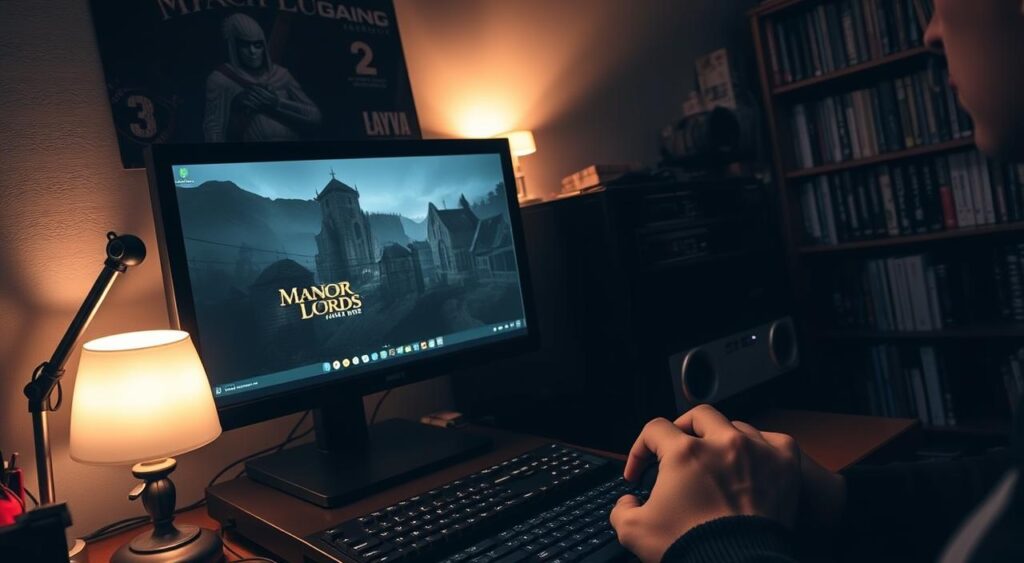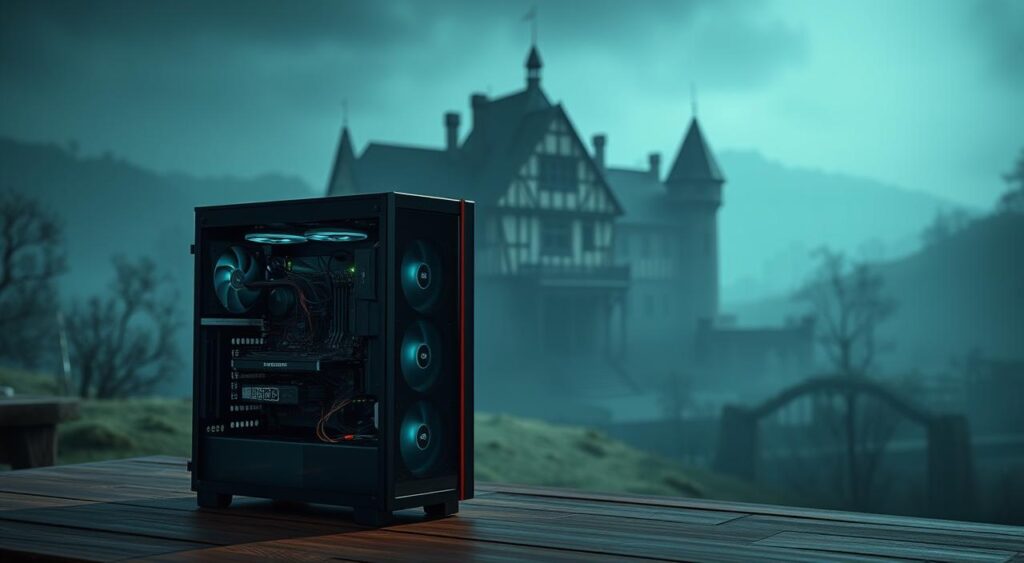I started playing Manor Lords on my mid-range PC, hoping for a smooth game. But, I faced performance issues that made playing tough.
Seeing low FPS was a big problem. I was surprised, given my PC’s specs. I looked for ways to fix it, wanting to enjoy the game without lag.
I found some fixes that helped. I’m sharing them to help others with Manor Lords on mid-range PCs.
Key Takeaways
- Check your PC’s specs against the game’s minimum requirements.
- Update your graphics drivers to the latest version.
- Adjust in-game graphics settings for better performance.
- Consider disabling unnecessary background applications.
- Monitor your PC’s temperature to prevent overheating issues.
My Experience with Manor Lords Performance Issues

When I started playing Manor Lords, I was eager to build my medieval city. But, I quickly ran into performance problems. I looked at my PC’s specs and compared them to the game’s needs.
My PC Specifications
My PC has an Intel Core i5-4590 CPU, 16GB RAM, and an Nvidia GeForce GTX 1050 GPU. The game says my CPU and GPU are good enough to run it.
Initial Performance Problems I Faced
Even though my PC meets the game’s minimum specs, I faced low frame rates and stuttering. The game’s performance was not steady. It got worse when I grew my city.
How It Affected My Gameplay
The performance issues made playing the game hard. The stuttering and low frame rates were frustrating. I had to change my plans and strategies often.
Understanding Manor Lords Low FPS on Mid-Range PC

Manor Lords is a game that needs a lot of power to run smoothly. It has complex gameplay that can slow down mid-range PCs. Let’s look at what makes it hard for these computers to keep up.
Why Medieval City Builders Are CPU-Intensive
Games like Manor Lords are tough on CPUs because they have lots of simulations. These include managing resources and building cities. The game’s engine focuses on resource gathering, crafting, and trade, which uses a lot of CPU power.
Some things that make these games CPU-heavy are:
- Complex pathfinding algorithms for characters and resources
- Detailed economic and population simulations
- Intricate building constructions and upgrades
Manor Lords’ Unique Engine Challenges
Manor Lords runs on a custom game engine that’s both a blessing and a curse. It makes the game rich and immersive, but it also demands more from your system. The developers have worked hard to make it run well, even on mid-range PCs.
Common Performance Bottlenecks
There are a few main reasons why Manor Lords might run slow. These include:
- Not enough CPU power for complex tasks
- Too little RAM or memory bandwidth
- Graphics settings that are too high for your computer
Knowing what slows down the game is key to making it run better on mid-range PCs. By tweaking Manor Lords graphics settings, players can boost their FPS and have a better gaming experience.
Analyzing Manor Lords System Requirements
I compared my PC with Manor Lords’ system requirements to find possible issues. This check is key to see if my mid-range PC can run the game well.
Official Minimum vs. Recommended Specs
The minimum specs for Manor Lords are an Intel Core i5 or AMD equivalent, 8 GB RAM, and a NVIDIA GeForce GTX 1060 or AMD Radeon RX 580 graphics card. The recommended specs are higher: an Intel Core i7 or AMD Ryzen 7, 16 GB RAM, and a NVIDIA GeForce RTX 3070 or AMD Radeon RX 6800 XT graphics card. This shows Manor Lords needs more powerful hardware for the best experience.
How My PC Compares to Requirements
My PC has an Intel Core i5 processor, 16 GB RAM, and a NVIDIA GeForce GTX 1660 Super graphics card. My processor and RAM match the recommended specs, but my graphics card is not as strong as the recommended NVIDIA GeForce RTX 3070. This might be why I got low FPS.
Real-World Performance Expectations
It’s clear my PC doesn’t fully meet Manor Lords’ recommended specs. To get a better idea of what to expect, let’s look at a comparison table:
| Component | Minimum Specs | Recommended Specs | My PC Specs |
|---|---|---|---|
| Processor | Intel Core i5 | Intel Core i7 | Intel Core i5 |
| RAM | 8 GB | 16 GB | 16 GB |
| Graphics Card | NVIDIA GeForce GTX 1060 | NVIDIA GeForce RTX 3070 | NVIDIA GeForce GTX 1660 Super |
This analysis shows my PC meets some specs but my graphics card might hold me back. Getting a better graphics card could really help my game performance.
Essential Graphics Settings Optimization
To fix Manor Lords stuttering on PC, tweaking graphics settings is key. The game’s medieval city-builder genre is very demanding. Optimizing settings can greatly improve performance.
Resolution and Display Mode Settings
Lowering the resolution can boost FPS. For example, going from 1080p to 900p makes a big difference. Also, switching from fullscreen to windowed mode helps by better managing resources.
Shadow Quality and Draw Distance
Reducing shadow quality eases GPU load. Lowering draw distance also helps by reducing rendered objects.
Texture and Effects Settings
Lowering texture quality and effects settings improves performance. These tweaks are great for mid-range PCs.
Anti-Aliasing and Post-Processing
Disabling or reducing anti-aliasing and post-processing effects boosts FPS. These features, though improving visuals, can be heavy on the GPU.
My Optimal Settings Configuration
After trying different settings, I found a good balance for my mid-range PC. Here’s what works best:
| Setting | Value |
|---|---|
| Resolution | 900p |
| Display Mode | Windowed |
| Shadow Quality | Low |
| Draw Distance | Medium |
| Texture Quality | Medium |
| Anti-Aliasing | Disabled |
By making these changes, I got a smoother game experience. Try these settings to find the best balance for your PC.
Advanced Troubleshooting for Manor Lords Stuttering
If Manor Lords is stuttering, don’t worry. There are advanced ways to fix it. We’ll look at some key strategies to boost your game’s performance.
Updating Drivers and Windows
First, check if your graphics drivers are current. Old drivers can slow down your game. Visit NVIDIA or AMD’s websites for the latest updates. Also, keep your Windows up-to-date. New versions often fix bugs and improve performance.
Background Processes and RAM Optimization
Background apps can use up system resources, hurting Manor Lords’ performance. Close any apps you don’t need. This frees up RAM and CPU for your game. If you’re always running low on memory, think about getting more RAM.
Community Mods and Unofficial Patches
The Manor Lords community has made many mods and patches. Look for them on sites like Nexus Mods. They can make your game run better. But, be careful when installing mods. Always follow the instructions closely.
Hardware Upgrade Considerations
If you’ve tried everything and the stuttering persists, it might be time for a hardware upgrade. A new GPU or a faster storage drive, like an SSD, can make a big difference. Manor Lords also supports FSR and DLSS, which can help if your hardware is compatible.
| Troubleshooting Step | Potential Impact |
|---|---|
| Updating Drivers | High |
| Optimizing Background Processes | Medium |
| Community Mods and Patches | Medium to High |
| Hardware Upgrades | High |
Conclusion
Dealing with low FPS in Manor Lords on a mid-range PC can be frustrating. But, there are steps you can take to improve performance. Optimizing graphics settings, troubleshooting common issues, and considering hardware upgrades can help.
Adjusting graphics settings like resolution, shadow quality, and texture settings can make a big difference. Also, updating drivers, managing background processes, and exploring community mods can help fix low FPS issues.
If you’re having trouble with Manor Lords low frame rate, try the steps in this article. With a few tweaks, you can enjoy a smoother experience in this medieval city builder. By implementing these fixes, you’ll be well on your way to resolving performance issues and enjoying the game fully.
